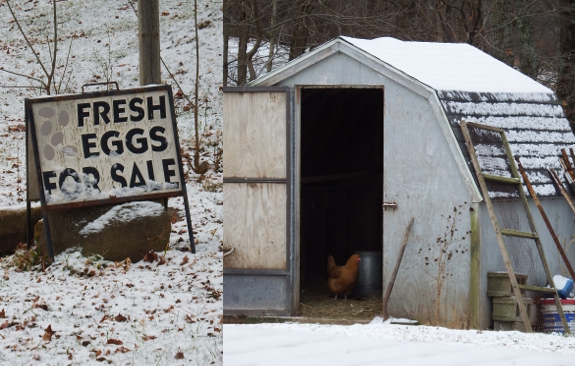
The cost of real free-range eggs

The trouble with growing
so much of our own food for so long is that we've grown extremely
snooty about quality. Which is a problem during this gap year when
we're stuck buying rather than raising our own.
Luckily, a neighbor just
a mile down the road has free range chickens that produce yolks as
orange as the ones I'm used to. She sells her eggs on a sliding scale,
but we didn't ask for a discount and are paying $4 per dozen. (No, the
eggs I bought at the farmer's market previously didn't make my quality
cut. They ranged from $3.50 to $4.50 per dozen.)
The question come spring
will be --- are we ready to fend off predators and get our own flock
back on the ground? Or will we be content with high quality eggs from a
neighbor?
Want more in-depth information? Browse through our books.
Or explore more posts by date or by subject.
About us: Anna Hess and Mark Hamilton spent over a decade living self-sufficiently in the mountains of Virginia before moving north to start over from scratch in the foothills of Ohio. They've experimented with permaculture, no-till gardening, trailersteading, home-based microbusinesses and much more, writing about their adventures in both blogs and books.
Want to be notified when new comments are posted on this page? Click on the RSS button after you add a comment to subscribe to the comment feed, or simply check the box beside "email replies to me" while writing your comment.

You will only be content with paying #4 a dozen until you have laying hens. Once you factor in the cost of a dozen straight run chicks(I paid $24), the cost of feed (chick starter and grit), electricity(for warmth for month unless you wait for warmer weather). We actually sprout our own grain and grind it for chick starter. Bedding for the brooder for the first month. After that they can free range. Then the cost for all these things become nil.
A safe place the hens (and train them to it) can deposit their eggs so you can find them. Otherwise they will lay wherever and you will never find them.
The benefits= culling out extra roosters (almost free meat)It's $2 a lb for a skinny bird at my grocer. Almost free eggs. When the cost is averaged out over a two year period of heavy laying. When the hens fall short in the laying process, about 3 to 5 tear mark) they are free meat. If you choose a broody variety of chickens like we do, they hatch out their own replacements. Once again free meat and free eggs. It's really free because you won't need a brooder or feed. You get a better quality, more nutritious meat and eggs, and flavor from home grown. No chemicals, no hormones, no GMOs, no antibiotic laden product. It;s a win-win.
Chickens will eat anything. Even citrus and onions contrary to beliefs. They don't like it but they will eat it. Chickens are living garbage disposals and garden wrecking balls, and they consider your leftovers as a treat. About having a coops and safe areas to roost, mine roosted on our front porch or the trees for years...year around until last year when the coyote population spiked and we lost 3/4 of our flock in one winter. They actually came up on our porch to get them. This was abnormal behavior for them. We built a coop for nighttime protection for the new flock. It was built out of free pallets so cost was minimal.
Hi Anna and Mark,
I guess that yolk color is perhaps a good beginning? I am wondering about what is really in my meat, eggs and milk for trace minerals? Is ANYONE testing them for micro and nano trace elements? Not that I know of. If you soil is deficient in stuff you need, known or unknown, you will join the endless procession of doctor, hospital and vet worshipers. So Redmond clay, granite dust, real seaweed and sea shells are probably your best bet for additives for your garden and other soil?
John
Yes, my time is included. Actually, after the first month, the chicks follow me everywhere and fend for themselves. In the garden they get offending bugs to munch on. The chickens see me and immediately think FOOD! I pretty much do have leftovers from the kitchen, or leftover fodder that the rabbit's didn't eat, or something.
They aren't a chore, they are my live comedy show. Better than TV. More interactive than a computer. The labor involved is picking up the eggs and raking the compost out of their new winter quarters. But then again, it goes to feed us too.
John
Yolk color, while appealing, isn't necessarily indicative of healthier hens or eggs. It is easily manipulated by what you feed the birds, and some breeds tend to have darker yolks naturally. My birds aren't free range (too many predators and they get into too much trouble when they are out), but they have a large yard, a decent coop, and lots of leftovers for variety in addition to a high protein feed. Yolk color varies through the year, but they are so fresh and tasty! And the duck eggs are even tastier (I have Muscovies, mostly for meat but I get the eggs they lay before the weather is warm enough for setting. Best ever for baking & pasta)